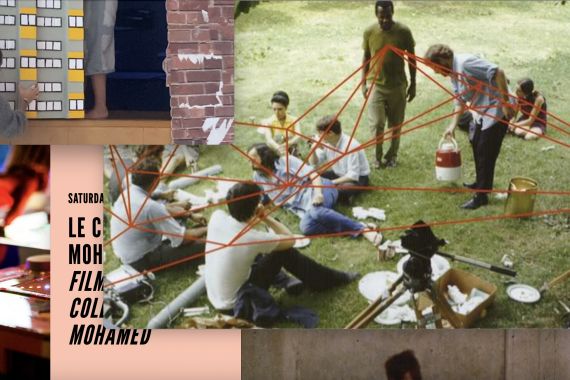
Welcome to an afternoon of presentations, panel discussions and interviews looking at the film medium’s potential for reversing gazes and recentering critical dialogues.
Future Futures brings together thirty young adults based in Sweden, Norway and Finland who are the members of Index Teen Advisory Board, PRAKSIS Teen Advisory Board (Oslo) and PUBLICS Youth Advisory Board (Helsinki). As part of the network, the boards address how institutions reach wider audiences, and more specifically, how they engage and interest young people in the arts.
This year, the members of Future Futures are looking at the moving image, using artistic methods to dismantle or challenge normative image culture. They have considered contemporary and historical references, consulting the work of Palestinian filmmakers, climate activists and civil rights defenders to explore how video has been instrumental in protest movements and the fight for political change. The groups have met with artists and curators, discussing how technological developments of the last decades have shifted the premises for how, and by whom, video is being recorded and distributed.
They invite you to The Future Futures Talk Show to think collectively about how video can be used to amplify underrepresented voices and diversify narratives within and beyond art institutions.
More
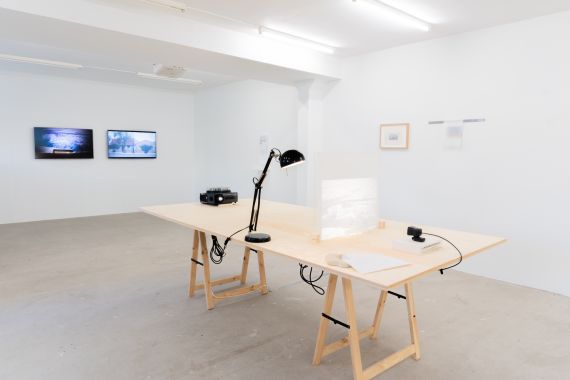
Massinissa Selmani’s installation, The which dwells in us (2023), and the preparatory drawings that accompany his installation provide one model for how to approach utopian social projects executed in architecture. His point of departure is an initiative—entitled the 1000 Socialist Villages—launched by the Algerian government in the late 1960s as part of an effort to cast emergent nationalism in a newly liberated country in a socialist light. Index invited the project’s curator, Natasha Marie Llorens, to contextualize Selmani’s methodological proposition of partial factuality, data loss, and history-as-rumor in a Swedish milieu. Llorens proposes a program that examines parrallels in the Swedish art scene: the incitement to modernization represented by the Per Albinhusen houses, the Million programme, and Stockholm’s gentrification and densification under liberalization policies in the last two decades. In this way, the public is invited to witness horizontal parity in artistic attention paid to two very different worlds—rather than consume history from elsewhere. More
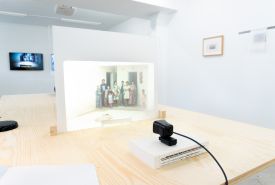 Natasha Marie Llorens will present some of the historical context for the 1000 Socialist Villages initiative in Algeria, a project that crucially borrowed heavily from a French colonial urban planning policy document called the Constantine Plan. Ostensibly, the 1000 Socialist Villages brought modern amenities and secure “rationally organized” housing to those who had been displaced from the land over generations by extractive land policies under colonial rule. Yet the Algerian government of the 1960s and 70s also sought to break the stronghold of an Algerian rural elite and centralize power in the hands of a national government by nationalizing their land for the gorund beneath the 1000 Socialist Villages. Llorens will discuss Selmani’s work as a practice that occupies the breach between competing interests. She will position Selmani as one who claims the right to opacity while simultaneously performing the crucial work of amnesis on behalf of an Algerian people.
Natasha Marie Llorens will present some of the historical context for the 1000 Socialist Villages initiative in Algeria, a project that crucially borrowed heavily from a French colonial urban planning policy document called the Constantine Plan. Ostensibly, the 1000 Socialist Villages brought modern amenities and secure “rationally organized” housing to those who had been displaced from the land over generations by extractive land policies under colonial rule. Yet the Algerian government of the 1960s and 70s also sought to break the stronghold of an Algerian rural elite and centralize power in the hands of a national government by nationalizing their land for the gorund beneath the 1000 Socialist Villages. Llorens will discuss Selmani’s work as a practice that occupies the breach between competing interests. She will position Selmani as one who claims the right to opacity while simultaneously performing the crucial work of amnesis on behalf of an Algerian people.
More
|
 Joanna Lombard will screen her Details From the Future (2007), a video work composed with film sequences appropriated from Costa-Gavras 1969 film Z. The film was shot in Algeria over the course of several years about that country’s liberation in 1962. Central to it are scenes of mob violence against an unspecified left-wing politician. In 2006, Lombard learned that both her mother and her aunt—both of whom lived in Algeria at the time—played as extras in Z’s mob scenes. Lombard’s video searches through the film footage for glimpses of her family while the voice over recounts anecdotes about her mother’s life. Details From the Future provides a point of departure for a performative lecture delving deeper into the correlations between Lombard’s personal history and the broader political currents that loosely tie Algeria and Sweden together in the mid-20th Century.
Joanna Lombard will screen her Details From the Future (2007), a video work composed with film sequences appropriated from Costa-Gavras 1969 film Z. The film was shot in Algeria over the course of several years about that country’s liberation in 1962. Central to it are scenes of mob violence against an unspecified left-wing politician. In 2006, Lombard learned that both her mother and her aunt—both of whom lived in Algeria at the time—played as extras in Z’s mob scenes. Lombard’s video searches through the film footage for glimpses of her family while the voice over recounts anecdotes about her mother’s life. Details From the Future provides a point of departure for a performative lecture delving deeper into the correlations between Lombard’s personal history and the broader political currents that loosely tie Algeria and Sweden together in the mid-20th Century.
More
|
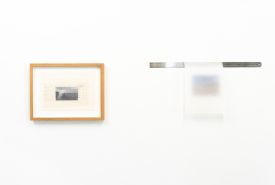 Johanna Gustafsson Fürst will screen excerpts from a 22-minute film, They had to start redesigning their systems (2011), to document a social practice project she led in the Stockholm suburb of Husby, which is paradigmatic of the Swedish architectural and urban planning initiative the Million Program. She will go on to discuss that relationship between that participatory, relational engagement with urban space and a sculpture project she made in the wake of her project in Husby, Public Green (2013). The green colour—a prominent protagonist in public places in for example Stockholm and Malmö —is a ubiquitous signifier of state-funded infrastructure in Sweden and elsewhere. Gustafsson Fürst reads it as a symbol of a politics that supports the common. In making sculptures for a gallery space using the color, the artist moves this symbol from public space to private space, mirroring a politics that seeks to dismantle that which is held in common and to privatize.
Johanna Gustafsson Fürst will screen excerpts from a 22-minute film, They had to start redesigning their systems (2011), to document a social practice project she led in the Stockholm suburb of Husby, which is paradigmatic of the Swedish architectural and urban planning initiative the Million Program. She will go on to discuss that relationship between that participatory, relational engagement with urban space and a sculpture project she made in the wake of her project in Husby, Public Green (2013). The green colour—a prominent protagonist in public places in for example Stockholm and Malmö —is a ubiquitous signifier of state-funded infrastructure in Sweden and elsewhere. Gustafsson Fürst reads it as a symbol of a politics that supports the common. In making sculptures for a gallery space using the color, the artist moves this symbol from public space to private space, mirroring a politics that seeks to dismantle that which is held in common and to privatize.
Emma Dominguez Martinez will screen Exile (2018), a short video that explores the aesthetic symmetry between her mother’s skin, scared by fibromyalgia, and the surfaces of buildings in Botkyrka, another Stockholm suburb constructed for the Million Program. Dominguez Martinez will speak about the archictural project as both the site of exile for her parents’ generation and a home for her from which she would eventually feel exiled from. Her questions include: How do you process closeness and longing for a place? What happens to the sadness that arises when we find roots in concrete structures but are forced to leave yet again? The film provides a way into questions about intergenerational trauma and site Dominguez goes on to develop in About place, exile and scars (2019), an installation that renders her interdiscplinary research.
After the presentations, both artists will join Llorens for a round table discussion about methodological choices each has made in the context of the Million Program, and the stakes of what Llorens has referring to as a ‘poetics of witnessing’.
More
|
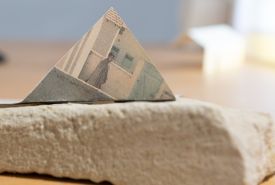 Taking both personal and societal experiences of loss, invisibility and silence as a point of departure to think through architecture, Jonas Dahlberg will speak about the potential of working with the built environment as a camouflaging practice; creating spaces that are architectural double agents. His main case study is Of Public Interest (OPI), an interdisciplinary studio he founded in Gröndal, Stockholm. OPI conducts its activities as a studio for realizing actual projects, a lab for research, and an advanced post-master course at Royal Institute of Art in Stockholm for learning. The emphasis of OPI is on taking an active part in critically re-imagining our common spaces, what values they contain, who they are for, in which ways they are shared, and how they are made and by whom.
Taking both personal and societal experiences of loss, invisibility and silence as a point of departure to think through architecture, Jonas Dahlberg will speak about the potential of working with the built environment as a camouflaging practice; creating spaces that are architectural double agents. His main case study is Of Public Interest (OPI), an interdisciplinary studio he founded in Gröndal, Stockholm. OPI conducts its activities as a studio for realizing actual projects, a lab for research, and an advanced post-master course at Royal Institute of Art in Stockholm for learning. The emphasis of OPI is on taking an active part in critically re-imagining our common spaces, what values they contain, who they are for, in which ways they are shared, and how they are made and by whom.
More
|
|
|





